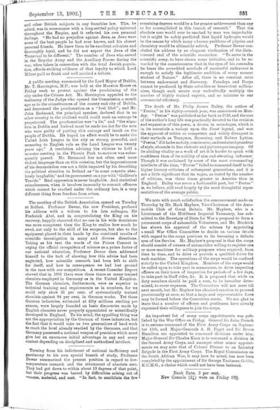The meeting of the British Association opened on Tuesday at
Belfast. Professor Dewar, the new President, prefaced his address with a tribute to his late colleague, Sir Frederick Abel, and in congratulating the King on his recovery, happily observed that no one in his wide dominions was more competent than the King to realise how much he owed, not only to the skill of his surgeons, but also to the equipment placed in their hands by the combined results of scientific investigation in many and diverse directions. Taking as his text the words of the Prince Consort in urging the official recognibion of science as a prime factor of our national education, Professor Dewar then addressed himself to the task of showing how this advice had been neglected, how scientific research had been left to shift for itself, and how in consequence we had lost ground in the race with our competitors. A recent Consular Report showed that in 1901 there were three times as many trained chemists employed in Germany as in the United Kingdom. The German chemists, furthermore, were as superior in technical training and requirements as in numbers, for we could only show 31 per cent. of systematically trained chemists against 84 per cent. in German works. 'Yet these German industries, estimated at fifty millions sterling per annum, were largely founded on basic discoveries made by English chemists never properly appreciated or scientifically developed in England. To his mind, the appalling thing was not the appropriation by the German of these industries, but the fact that it would take us two generations of hard work to reach the level already reached by the Germans, and that Germany possessed a national weapon of precision which must give her an enormous initial advantage in any and every contest depending on disciplined and methodised intellect.






































 Previous page
Previous page